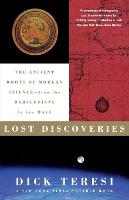


|
|
|
books
| book details |
Lost Discoveries: The Ancient Roots of Modern Science--From the Babylonians to the Maya
By (author) Dick Teresi

|
This book is currently unavailable. Enquire to check if we can source a used copy
|
| book description |
*A New York Times Notable Book* Boldly challenging conventional wisdom, acclaimed science writer and Omni magazine cofounder Dick Teresi traces the origins of contemporary science back to their ancient roots in this eye-opening and landmark work. This innovative history proves once and for all that the roots of modern science were established centuries, and in some instances millennia, before the births of Copernicus, Galileo, and Newton. In this enlightening, entertaining, and important book, Teresi describes many discoveries from all over the non-Western world--Sumeria, Babylon, Egypt, India, China, Africa, Arab nations, the Americas, and the Pacific islands--that equaled and often surpassed Greek and European learning in the fields of mathematics, astronomy, cosmology, physics, geology, chemistry, and technology. The first extensive and authoritative multicultural history of science written for a popular audience, Lost Discoveries fills a critical void in our scientific, cultural, and intellectual history and is destined to become a classic in its field.
| product details |
Normally shipped |
Publisher | Simon & Schuster
Published date | 7 Oct 2003
Language |
Format | Paperback / softback
Pages | 464
Dimensions | 216 x 140 x 28mm (L x W x H)
Weight | 544g
ISBN | 978-0-7432-4379-7
Readership Age |
BISAC | science / history
| other options |
|
|
|
To view the items in your trolley please sign in.
| sign in |
|
|
|
| specials |
|
This first comprehensive biography of Cecil Rhodes in a generation illuminates Rhodes’s vision for the expansion of imperialism in southern Africa, connecting politics and industry to internal development, and examines how this fueled a lasting, white-dominated colonial society.
|
|
Let's stare the future down and, instead of fearing AI, become solutionists.
|
|
|
|
|